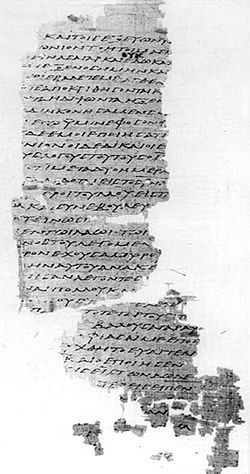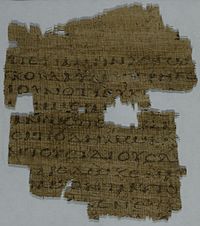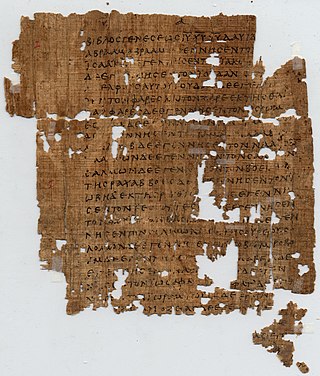
Matthew 24 is the twenty-fourth chapter of the Gospel of Matthew in the New Testament of the Christian Bible. It commences the Olivet Discourse or "Little Apocalypse" spoken by Jesus Christ, also described as the Eschatological Discourse, which continues into chapter 25. It contains Jesus' prediction of the destruction of the Temple in Jerusalem. Mark 13 and Luke 21 also cover the same material.

Matthew 28 is the twenty-eighth and final chapter of the Gospel of Matthew in the New Testament. This chapter records that Jesus is risen, describes the actions of the first witnesses to this event, and ends with the Great Commission.

Matthew 10 is the tenth chapter in the Gospel of Matthew in the New Testament section of the Christian Bible. This chapter opens with Jesus calling some of his disciples and sending them out to preach and heal. This section is also known as the Mission Discourse or the Little Commission, in contrast to the Great Commission at the end of the gospel. The Little Commission is directed specifically to the "lost sheep of the house of Israel", while the Great Commission is directed to all nations. The Pulpit Commentary suggests that Jesus' message in this discourse "was hardly likely to have been remembered outside Jewish Christian circles".

Matthew 23 is the twenty-third chapter in the Gospel of Matthew in the New Testament section of the Christian Bible, and consists almost entirely of the accusations of Jesus against the Pharisees. The chapter is also known as the Woes of the Pharisees or the "Seven Woes". In this chapter, Jesus accuses the Pharisees of hypocrisy. Some writers treat it as part of the final discourse of Matthew's gospel.

Matthew 13 is the thirteenth chapter in the Gospel of Matthew in the New Testament section of the Christian Bible. Verses 3 to 52 of this chapter form the third of the five Discourses of Matthew, called the Parabolic Discourse, based on the parables of the Kingdom. At the end of the chapter, Jesus is rejected by the people of his hometown, Nazareth.

Matthew 26 is the 26th chapter of the Gospel of Matthew, part of the New Testament of the Christian Bible. This chapter covers the beginning of the Passion of Jesus narrative, which continues to Matthew 28; it contains the narratives of the Jewish leaders' plot to kill Jesus, Judas Iscariot's agreement to betray Jesus to Caiphas, the Last Supper with the Twelve Apostles and institution of the Eucharist, the Agony in the Garden of Gethsemane and the subsequent vindication of Jesus' predictions, of betrayal by one of the twelve Apostles, and that he will, in the Denial of Peter, be disowned by his closest follower, Saint Peter.

Matthew 11 is the eleventh chapter in the Gospel of Matthew in the New Testament section of the Christian Bible. It continues the narrative about Jesus' ministry in Galilee.

Matthew 12 is the twelfth chapter in the Gospel of Matthew in the New Testament section of the Christian Bible. It continues the narrative about Jesus' ministry in Galilee and introduces controversy over the observance of the Sabbath for the first time.

Matthew 15 is the fifteenth chapter in the Gospel of Matthew in the New Testament section of the Christian Bible. It concludes the narrative about Jesus' ministry in Galilee and can be divided into the following subsections:
Matthew 16 is the sixteenth chapter in the Gospel of Matthew in the New Testament section of the Christian Bible. Jesus begins a journey to Jerusalem from the vicinity of Caesarea Philippi, near the southwestern base of Mount Hermon. Verse 24 speaks of his disciples "following him".

Matthew 17 is the seventeenth chapter in the Gospel of Matthew in the New Testament section of the Christian Bible. Jesus continues his final journey to Jerusalem ministering through Galilee. William Robertson Nicoll identifies "three impressive tableaux" in this chapter: the transfiguration, the epileptic boy and the temple tribute.
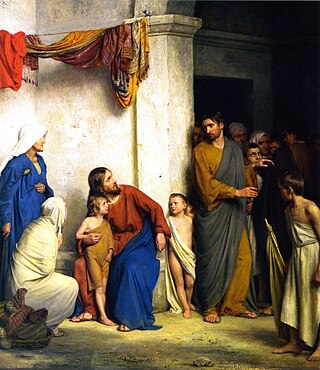
Chapter 18 of the Gospel of Matthew contains the fourth of the five Discourses of Matthew, also called the Discourse on the Church or the ecclesiastical discourse. It compares "the greatest in the Kingdom of Heaven" to a child, and also includes the parables of the lost sheep and the unforgiving servant, the second of which also refers to the Kingdom of Heaven. The general theme of the discourse is the anticipation of a future community of followers, and the role of his apostles in leading it.

Matthew 19 is the nineteenth chapter in the Gospel of Matthew in the New Testament section of the Christian Bible. The book containing this chapter is anonymous, but early Christian tradition uniformly affirmed that Matthew composed this Gospel. Jesus commences his final journey to Jerusalem in this chapter, ministering through Perea. It can be seen as the starting point for the passion narrative.

Matthew 20 is the twentieth chapter in the Gospel of Matthew in the New Testament of the Christian Bible. Jesus continues his final journey through Perea and Jericho, heading towards Jerusalem, which he enters in the following chapter.

Matthew 21 is the twenty-first chapter in the Gospel of Matthew in the New Testament section of the Christian Bible. Jesus triumphally or majestically arrives in Jerusalem and commences his final ministry before his Passion.
John 16 is the sixteenth chapter of the Gospel of John in the New Testament of the Christian Bible. It records Jesus' continued farewell discourse to his disciples, set on the last night before his crucifixion. Three key words in this chapter, ἁμαρτία, δικαιοσύνη, κρίσις "comprehend the three great steps of advance in spiritual truth among men". Jesus speaks about the work of the Holy Spirit, the joy of the believers and his victory over the world. The book containing this chapter is anonymous, but early Christian tradition uniformly affirmed that John composed this Gospel.

John 18 is the eighteenth chapter of the Gospel of John in the New Testament of the Christian Bible. This chapter records the events on the day of the Crucifixion of Jesus, starting with the arrest of Jesus the evening before. The three denials of Peter are interwoven into the narrative concerning the trials of Jesus.
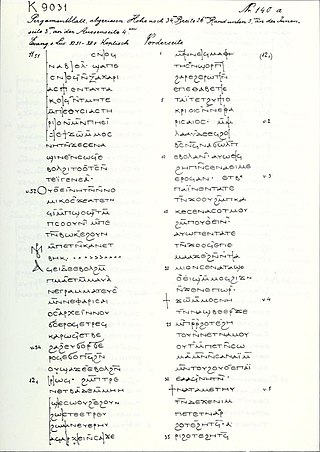
Luke 12 is the twelfth chapter of the Gospel of Luke in the New Testament of the Christian Bible. It records a number of teachings and parables told by Jesus Christ when "an innumerable multitude of people had gathered together", but addressed "first of all" to his disciples. The book containing this chapter is anonymous, but early Christian tradition uniformly affirmed that Luke the Evangelist composed this Gospel as well as the Acts of the Apostles.
Luke 18 is the eighteenth chapter of the Gospel of Luke in the New Testament of the Christian Bible. It records the teachings and a miracle of Jesus Christ. The book containing this chapter is anonymous, but early Christian tradition uniformly affirmed that Luke the Evangelist composed this Gospel as well as the Acts of the Apostles.

Luke 21 is the twenty-first chapter of the Gospel of Luke in the New Testament of the Christian Bible. It records the observations and predictions of Jesus Christ delivered in the temple in Jerusalem, and his exhortation "to be watchful". The book containing this chapter is anonymous, but early Christian tradition uniformly affirmed that Luke the Evangelist composed this Gospel as well as the Acts of the Apostles.
